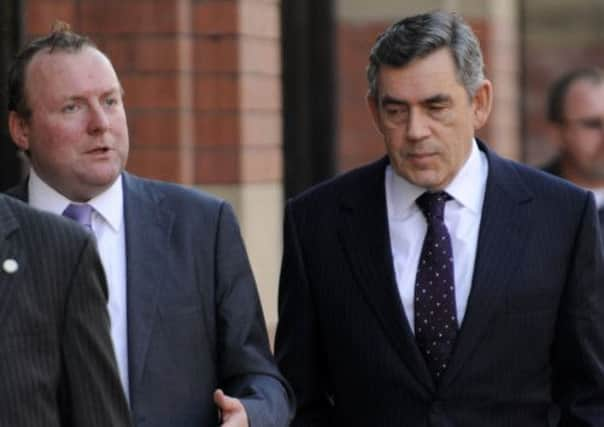Gordon Brown ‘had smear campaign against rivals’


Special adviser secretary Damian McBride confesses to leaking stories to the press about former home secretaries John Reid and Charles Clarke at a time when he was determined to ensure Mr Brown succeeded Tony Blair as Prime Minister.
In his book Power Trip, serialised in the Daily Mail, he reveals details of the infighting and media manipulation in the Labour party in the run-up to Mr Blair stepping down in 2007.
Advertisement
Hide AdAdvertisement
Hide AdIt comes as The Guardian published emails showing how Mr Blair’s aides sought to counter what they viewed as Mr Brown’s coup to secure power at Number 10.
Mr McBride said he acted “out of loyalty and devotion” for Mr Brown, the then Chancellor of the Exchequer, who he said was unaware of his attempts to discredit rivals.
He wrote: “Labour, Conservative or Liberal Democrat; Ministers, MPs or advisers; if they’d ever shared their secrets with colleagues in Westminster, the chances were that I ended up being told about them, too.
Risk and blame
“Drug use; spousal abuse; secret alcoholism; extra-marital affairs.
“I estimate I did nothing with 95% of the stories I was told. But, yes, some of them ended up on the front pages of Sunday newspapers.”
He said his motivation was to protect Mr Brown.
“I offered him the best press he could hope for, unrivalled intelligence about what was going on in the media and access to parts of the Press that no other Labour politician could reach,” he said.
“And my attack operations against his Labour rivals and Tory enemies were usually both effective and feared, with me willingly taking all the potential risk and blame.”
The publication today of extracts from his book comes as emails emerged detailing how Mr Blair’s core team tried to avoid declaring when he would step down as PM, 15 months after he had been voted to serve a third term in power, to make way for Mr Brown’s apparent succession.
Advertisement
Hide AdAdvertisement
Hide AdThe messages cover August 21, 2006 to September 8, 2006, and show how figures from Number 10 and Labour attempt to deal with increasing pressure for clarity on Mr Blair’s future.
Shadow over Labour
Ben Wegg-Prosser, former director of strategic communications in Number 10, is the source of the messages, which have been published by the Guardian.
The content includes discussions on which MPs could support Mr Blair’s cause, statements drafted for the prime minister, briefings to the media and the apparent frustrations of Mr Blair.
There is also talk of finding candidates for a leadership contest with Mr Brown, including the possibility of persuading David Miliband to stand.
Writing for the Guardian, Mr Wegg-Prosser said the manner of Mr Blair’s departure still “casts a shadow” over Labour.
He said: “The ‘coup’ of September 2006 was the culmination of 12 years of mutual frustration between the occupants of numbers 10 and 11 Downing Street. The constant ding-dongs served neither man well.”
Mr Wegg-Prosser added: “Looking back, the response from Team Blair to the letter-writing campaign to remove him from office was remarkably naive, coordinated through random email chains, conference calls and impromptu meetings.
Blair exit
“It is now clear that Team Brown were effectively running a disciplined war-room with battle plans and an agreed sequence of attack. That it should have come to this is profoundly depressing.
Advertisement
Hide AdAdvertisement
Hide Ad“It was also clear that Brown’s team were convinced that the answer to every problem which Labour faced was that Blair should go. We, on the other hand, toyed with the idea of boosting other potential challengers to Brown. Curiously, whenever the issue was raised with the prime minister he was reluctant to engage.”
Mr Wegg-Prosser conceded: “The sheer emotional energy these scrapes consumed does not reflect well on any of the participants - me included.
“Everyone who participated in them, from ministers, MPs, advisers and many more civil servants than is ever acknowledged, should reflect on what else could have been achieved if we weren’t fighting.”